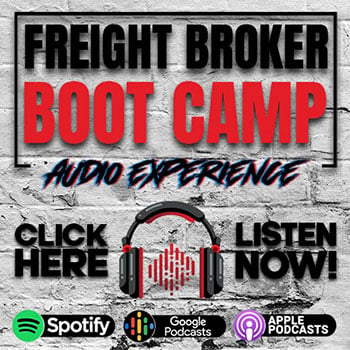Oddly enough the terms freight forwarder and freight broker are frequently used incorrectly. Mainly because people do not fully understand the difference between a freight forwarder vs freight broker.
In the United States there are many key players in the logistics industry, each playing an important role in helping freight get to its final destination on time and in good condition. .
Some of these key players like freight brokers and freight forwarders have similar, yet different roles in the logistics industry.
Here we will cover many of the most common questions and key differences between freight forwarders and freight brokers, including:
- What does a freight forwarder do?
- When to hire a forwarder?
- What does a freight broker do?
- When to hire a broker?
- What is the difference between a freight broker vs freight forwarder?
- Real World Examples: Freight Broker vs. Freight Forwarder
- Do I need a freight forwarder or a freight broker?
- Frequently Asked Questions (FAQ)
- Conclusion
What does a freight forwarder do?
Freight forwarders manage the movement of products and goods both domestic and internationally. Freight forwarders help manage the entire shipping process of goods through different modes such as air, ocean, rail, and truck.
Forwarders are licensed by the Federal Motor Carrier Safety Administration (FMCSA) and receive their freight forwarder authority. They may also operate their own fleet and transport the freight themselves but are required to get an approve motor carrier authority from the FMCSA.
Not only do they help arrange transport, freight forwarders also manage the documentation and paperwork for international commerce. This includes any import/export or customs documentations and bills of lading (BOL). Freight forwarders are responsible for regulatory compliance on all shipments both domestic and international.
For certain shipments, freight forwarders may consolidate smaller shipments or deconsolidate shipments as needed to optimize cargo space. They also provide tracking and monitoring of their shipments from origin to destination and handle any potential logistical issues along the way.
Typical freight forwarding tasks include:
- Arranging transportation services (air, ocean, rail and trucking)
- Export and customs documentation
- Cargo insurance based upon the shippers needs
- Freight storage and warehousing
- Consolidation of goods (and deconsolidation)
- Tracking and monitoring of shipments
When to hire a forwarder?
You might consider hiring a freight forwarder if you find yourself in need of a wide range of services, shipping goods internationally (foreign commerce) and need support managing customs regulations and customs paperwork.
Additionally, working with a freight forwarder is a good idea if you want end-to-end logistical support including shipment consolidation or intermodal freight movement.

International Shipment Example:
ABC Widgets Company is importing products from China.
- ABC Widgets purchases product from Chinese supplier.
- ABC Widget hires international freight forwarder to arrangement transport of the product from Chinese manufacturer in Shanghai, China and deliver the product to Los Angeles, CA.
- The forwarder is now responsible to arrange truck transport from Shanghai to a nearby ocean port. The product is then loaded onto an ocean vessel heading to the port of Los Angels.
- After arrival in Los Angeles, the forwarder will arrange truck transport to ABC Widgets warehouse.
- Along the way the freight forwarder is responsible for import and export customs clearance to ensure all laws are followed and duties/taxes are paid.
What does a freight broker do?
Freight brokers also help manage the transportation of goods and work with shippers and freight carriers. Freight brokers are licensed by the Federal Motor Carrier Safety Administration (FMCSA) and receive their freight broker authority.
Brokers don’t handle the goods directly and don’t take physical possession of the shippers freight. This is a primary reason why freight brokers are NOT required to have cargo insurance or BIPD insurance.
Freight brokers oversee and manage the shipping of freight with the actual motor carrier and truck driver to make sure the shipment is cost-effective, timely, and reliable. They serve as a single point of contact for shippers and can provide a range of transportation services.

Freight brokers match freight shipments with the appropriate motor carriers based on several factors including cargo capacity, route, equipment type and more. Their freight business market expertise helps shippers make informed decisions and they play a crucial role in the supply chain.
Similar to freight forwarders, a freight broker acts following the legal requirements set by the FMCSA who oversees their broker authority.
Freight broker tasks may include:
- Negotiating freight rates
- Motor carrier sourcing and selection
- Tracking and monitoring of shipments
- Problem solving thru to delivery
- Invoicing shipper
- Payment to trucking company
When to hire a broker?
While any sized business can benefit from the services of a freight broker, individuals and companies that ship large quantities or specialty cargo may especially benefit.
You might consider hiring a freight broker if you find yourself in need of finding motor carrier services to oversee your shipments traveling by truck.
They are experts at finding the appropriate carriers for your shipments and manage the process, including any issues arise during transport.
What is the difference between a freight broker vs freight forwarder?
The main difference between these two logistics experts, a freight forwarder vs a freight broker, is their scope of services. Both freight forwarders and freight brokers are licensed by the FMCSA, but serve different needs.
3 main differences between freight broker vs freight forwarder:
- Freight forwarders take possession of the cargo while freight brokers do not.
- Freight forwarders are required to have cargo insurance while brokers do not.
- Freight brokers focus mainly on domestic truck related freight management, while freight forwarders do multi modal transport as well as end to end logistics solutions that may include international shipments, import/export and customs services.
Real World Examples: Freight Broker vs. Freight Forwarder
Example 1: The Global Importer
A New York based electronics importer used a freight forwarder to move goods from Shenzhen, China, to Long Beach, CA.
The forwarder handled export documentation, ocean shipping, customs brokerage, and warehousing.
Once cleared, a freight broker arranged domestic trucking to deliver the goods to regional distribution centers.
Example 2: The Domestic Manufacturer
A steel manufacturer in Ohio ships across the Midwest. They rely solely on a freight broker to book trucks and manage rate negotiations.
Since they don’t deal with customs or overseas freight, a forwarder would add unnecessary cost and complexity.
Example 3: The Hybrid Logistics Strategy
A U.S. apparel brand ships raw fabric from India via a forwarder, then uses a broker to distribute finished products to retailers nationwide.
This hybrid model combines the forwarder’s global reach with the broker’s domestic flexibility.
Do I need a freight forwarder or a freight broker?
The decision to hire a freight forwarder or a freight broker depends on your specific needs.
- Hire a freight broker if you need support managing domestic freight including finding reliable carriers, negotiating competitive freight rates and ensuring freight is delivered on time.
- Hire a freight forwarder if you need end-to-end logistics support including international freight, customs documentation and even warehousing.
Frequently Asked Questions (FAQ)
1. Can a freight broker also be a freight forwarder?
Yes, but not automatically. You must obtain both FMCSA broker authority and an FMC freight forwarder license to legally perform both functions.
2. Do freight forwarders own trucks or warehouses?
Some do, but most don’t. Many operate through third-party carriers and warehouse partners, just like brokers.
3. Who earns more money freight brokers or freight forwarders?
It depends on the operation size and service mix.
- Forwarders often handle higher value shipments but carry more liability and cost.
- Brokers can achieve higher profit margins per transaction with lower overhead.
4. Is a freight forwarder better for small businesses?
Not always. For most domestic, small-volume shippers, a freight broker is simpler and more cost-effective.
If you’re importing or exporting, you’ll likely need a forwarder.
5. Are freight brokers regulated like freight forwarders?
Yes, brokers are regulated by the FMCSA under the U.S. Department of Transportation, while forwarders fall under the Federal Maritime Commission (FMC) for ocean transport and IATA for air cargo.
6. Can a freight broker handle international shipments?
Brokers can coordinate international freight indirectly by partnering with forwarders but they can’t legally handle customs clearance or export documentation on their own.
7. Is it easier to start as a broker or forwarder?
Generally, becoming a freight broker is faster and cheaper.
You’ll need less capital and fewer regulatory filings. That’s why many forwarders start as brokers first, then expand globally.
8. What’s the best career path for someone new to logistics?
Start domestic → learn brokerage → then explore freight forwarding once you understand carrier relationships, rates, and compliance.
Conclusion
Freight forwarders and freight brokers have similar, yet diifferent roles and responsibilities in the movement of goods within the complex market of the transportation industry.
If you are looking to get started on your path towards running your own freight brokerage, learn why over 10,000 students have joined my training program.
P.S. Did you enjoy this article? If so, COMMENT below and then SHARE on LinkedIn, Facebook or X! We truly appreciate your support.



